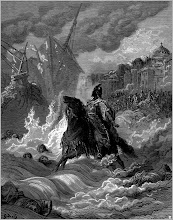Dimensions of Conflict
Conflict can never be eradicated, but it can be shifted. Civil wars took place regularly in most civilizations to settle claims to the throne and, though we may frown upon such activities, they were perfectly legitimate and rational responses to a power struggle. We can all think of societies whose civil conflicts dragged on (and have dragged on), but most warlords who emerge to take control of a country have proven their ability to defend that domain.
Naturally, as greater external threats emerged, despotic and relatively free regimes alike shifted the conflict inward. States of the former character exercised this conflict through maneuver, intermarriage, and assassination; states of the latter tended toward elite or popular elections, which are little more than conflict played out through the gathering of resources, namely power bases like wealth, employment, and prestige, and of course the voters themselves.
This will never go away, but as surely as conflict exists in tyrannies, lawless regions, and republics alike, we can choose how we exercise that struggle inherent not only to our species but to life itself.
In my eyes, the greatest solution to wasteful conflict (which is, conflict which does not advance the species) is not so much a change to conflict itself, but a change of focus, a change of stakes.
No greater boon to the pursuit of peace can be found than the colonization of space and of other worlds. It is only natural that as industrial civilization continues its development and as populations continue to grow (for a large population is not as disastrous as it used to be, as China and India have shown, and in any case, US population growth is still rather high), conflict will only intensify, as the wells of oil and water dry up and more of the globe must be utilized, to a greater degree than ever before.
Now if you want to delve into the dark heart of man, I would still encourage it. For it is an old magic, this worship of blood-letting that follows us in all our activities and shakes us from our disciplines. And wherever we go, we will carry it with us, this ancient predilection, and so we ought to know this about ourselves.
But it may be pointless even now to argue about the cultural underpinnings of war, about the ideologies that justify hatred. Even now, we may be living in a world where, as Nietzsche said, it is not the cause that justifies the war, but the war that justifies any cause. Very well to look for human frailty in the masses and the leaders, for you will find it. But do not miss the dying rivers, do not miss the failing crops, do not miss the basic material laws, older and truer than any of us.
As long as we cover the earth with our living, we will cover it with our dead. When it comes to this increasingly relevant fact, it achieves little to peer inside our souls. In ages of plenty, we fought as a pastime. Our heirs will fight of necessity. That is, unless someone finds a way out.
Naturally, as greater external threats emerged, despotic and relatively free regimes alike shifted the conflict inward. States of the former character exercised this conflict through maneuver, intermarriage, and assassination; states of the latter tended toward elite or popular elections, which are little more than conflict played out through the gathering of resources, namely power bases like wealth, employment, and prestige, and of course the voters themselves.
This will never go away, but as surely as conflict exists in tyrannies, lawless regions, and republics alike, we can choose how we exercise that struggle inherent not only to our species but to life itself.
In my eyes, the greatest solution to wasteful conflict (which is, conflict which does not advance the species) is not so much a change to conflict itself, but a change of focus, a change of stakes.
No greater boon to the pursuit of peace can be found than the colonization of space and of other worlds. It is only natural that as industrial civilization continues its development and as populations continue to grow (for a large population is not as disastrous as it used to be, as China and India have shown, and in any case, US population growth is still rather high), conflict will only intensify, as the wells of oil and water dry up and more of the globe must be utilized, to a greater degree than ever before.
Now if you want to delve into the dark heart of man, I would still encourage it. For it is an old magic, this worship of blood-letting that follows us in all our activities and shakes us from our disciplines. And wherever we go, we will carry it with us, this ancient predilection, and so we ought to know this about ourselves.
But it may be pointless even now to argue about the cultural underpinnings of war, about the ideologies that justify hatred. Even now, we may be living in a world where, as Nietzsche said, it is not the cause that justifies the war, but the war that justifies any cause. Very well to look for human frailty in the masses and the leaders, for you will find it. But do not miss the dying rivers, do not miss the failing crops, do not miss the basic material laws, older and truer than any of us.
As long as we cover the earth with our living, we will cover it with our dead. When it comes to this increasingly relevant fact, it achieves little to peer inside our souls. In ages of plenty, we fought as a pastime. Our heirs will fight of necessity. That is, unless someone finds a way out.


0 Comments:
Post a Comment
<< Home